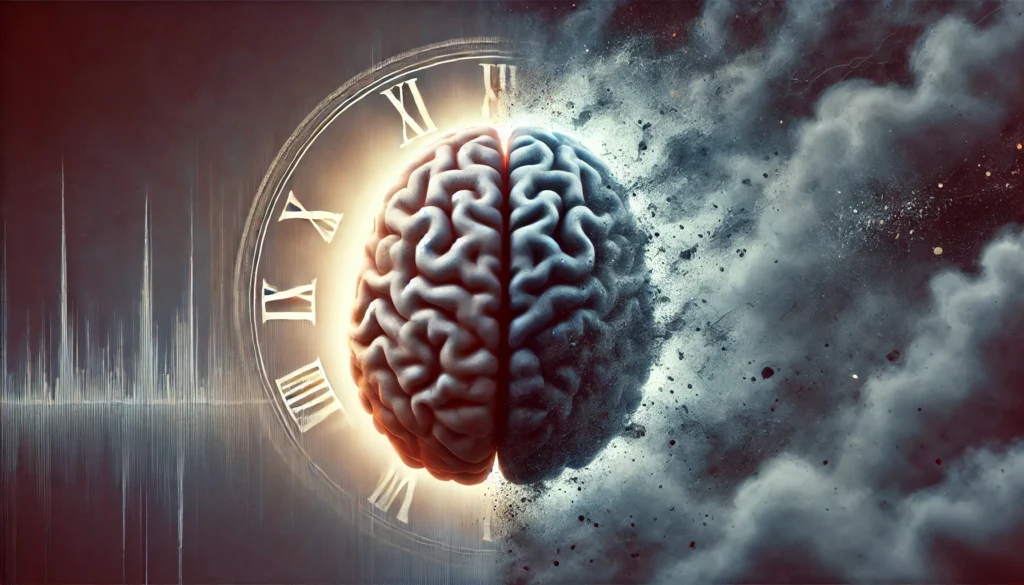Dementia is not a single disease but rather an umbrella term that encompasses a range of cognitive impairments affecting memory, thinking, and social abilities severely enough to interfere with daily life. Alzheimer’s disease is the most common type, but there are other forms, including vascular dementia, Lewy body dementia, and frontotemporal disorders.
You may also like: Understanding the Science Behind Lost Memory
The Gradual Nature of Dementia
Generally, dementia develops slowly over time. The onset is typically insidious, with early symptoms like mild forgetfulness or confusion often mistaken for normal aging. Over time, these symptoms worsen, leading to significant cognitive decline and impacting daily functioning. Patients and their families may initially overlook these early signs, attributing them to stress or fatigue. However, as the disease progresses, the symptoms become more pronounced, affecting the individual’s ability to perform daily tasks and maintain independence.
Types of Dementia
The most prevalent type of dementia is Alzheimer’s disease, accounting for 60-80% of cases. Vascular dementia, the second most common type, results from blood vessel blockages or strokes. Lewy body dementia involves abnormal protein deposits affecting brain chemistry, leading to cognitive and motor symptoms. Frontotemporal disorders, which are rarer, primarily impact personality, behavior, and language due to degeneration in the brain’s frontal and temporal lobes.
Factors Influencing Dementia Progression
Several factors can influence how quickly dementia symptoms progress. Genetics play a significant role, with certain gene mutations increasing risk. Lifestyle factors, such as diet and exercise, also affect disease progression. Additionally, coexisting medical conditions, like hypertension or diabetes, can accelerate cognitive decline. Understanding these factors can help in developing personalized management plans for patients.
Can Dementia Appear Suddenly?
While dementia is typically gradual, there are instances where symptoms appear to come on suddenly. This phenomenon often prompts the question: can dementia happen overnight?
Rapid Onset Dementia
Rapid onset dementia is a medical condition where the cognitive decline appears to occur swiftly, often over weeks or months rather than years. This can be particularly alarming for families and caregivers who witness a loved one’s sudden loss of cognitive abilities. However, true overnight dementia is rare and might indicate other underlying conditions. The sudden emergence of symptoms often necessitates an immediate medical evaluation to rule out reversible causes.
Medical Conditions Leading to Rapid Onset
Several medical conditions can mimic rapid onset dementia. These include delirium, which is an acute confusional state often triggered by infections or medications. Another is transient ischemic attacks, which are mini-strokes that can cause temporary cognitive impairments. Infections such as urinary tract infections or severe pneumonia can also lead to abrupt cognitive changes, especially in the elderly.
Psychological and Environmental Triggers
Psychological conditions like severe depression can mimic dementia, often referred to as pseudodementia. Environmental factors, such as significant life changes or trauma, can exacerbate symptoms, causing a sudden decline in cognitive function. Addressing these triggers through therapy and environmental adjustments can often reverse the symptoms, highlighting the importance of a comprehensive evaluation.
How Fast Can Dementia Symptoms Come On?
The speed at which dementia symptoms develop can vary greatly depending on the underlying cause. In cases of rapid onset dementia, symptoms might progress quickly over a few months. For others, it may take years for the full spectrum of symptoms to manifest.

Conditions That Mimic Dementia
Several conditions can mimic dementia, causing symptoms to appear suddenly or fluctuate:
- Depression: Sometimes referred to as “pseudodementia,” depression can cause memory and concentration issues, leading to an incorrect dementia diagnosis. Treating the depression can often alleviate these cognitive symptoms.
- Normal Pressure Hydrocephalus: This condition, characterized by memory loss, gait disturbance, and urinary incontinence, can be mistaken for dementia but is treatable if diagnosed correctly. It involves an accumulation of cerebrospinal fluid in the brain’s ventricles.
- Chronic Traumatic Encephalopathy (CTE): Often found in individuals with a history of repeated head trauma, CTE can manifest with dementia-like symptoms. It is commonly observed in athletes and veterans with a history of concussions.
The Role of Comprehensive Assessments
Accurate diagnosis requires a thorough assessment, which involves evaluating cognitive and physical health. Cognitive tests, brain imaging, and blood tests are essential to distinguish between dementia and other conditions. These assessments can identify reversible causes of cognitive decline, allowing for appropriate treatment.
Importance of Early Detection
Early detection of dementia symptoms is crucial for effective management. It allows for early intervention, which can slow disease progression and improve quality of life. Educating patients and caregivers about early signs can facilitate timely medical consultation and diagnosis.
Can Dementia Symptoms Come and Go?
Dementia symptoms can fluctuate, particularly in conditions like Lewy body dementia, where patients may experience periods of relative clarity followed by confusion. However, true dementia generally results in a steady decline over time.
The Role of Environmental Factors
Factors such as stress, fatigue, or changes in routine can exacerbate symptoms temporarily. Ensuring a stable environment and routine can help manage these fluctuations. This involves maintaining a consistent daily schedule, ensuring adequate rest, and reducing stressors that may trigger cognitive decline.
Impact of Medications and Treatments
Certain medications can influence the fluctuation of dementia symptoms. Adjusting medication regimens or exploring alternative treatments can help stabilize symptoms. Regular consultations with healthcare providers are essential to optimize treatment plans and minimize adverse effects.

Psychological Support and Therapy
Psychological support, including therapy and counseling, can help manage fluctuations in dementia symptoms. Cognitive behavioral therapy and other therapeutic interventions can provide coping strategies for patients and caregivers, improving overall well-being and quality of life.
Diagnosing Dementia and Its Onset
Accurate diagnosis is essential to determine whether symptoms are due to dementia or another condition. This process typically involves a comprehensive assessment, including:
- Medical History: Gathering information about symptoms, medical conditions, medications, and family history. Understanding the patient’s background provides insight into potential risk factors and underlying causes.
- Cognitive and Neuropsychological Tests: Assessing memory, problem-solving, language, and other cognitive functions. These tests help evaluate the extent and nature of cognitive impairment.
- Brain Imaging: MRI or CT scans can help identify strokes, tumors, or other brain abnormalities. Imaging provides a visual assessment of brain structure and function, aiding in diagnosis.
- Laboratory Tests: Blood tests can rule out vitamin deficiencies, infections, or metabolic conditions. Identifying and treating these conditions can alleviate symptoms and improve cognitive function.
The Importance of a Multidisciplinary Approach
A multidisciplinary approach involving neurologists, psychologists, and other specialists is crucial for accurate diagnosis and management. Collaboration among healthcare professionals ensures a comprehensive evaluation and personalized treatment plan, addressing all aspects of the patient’s health.
Ongoing Monitoring and Follow-Up
Regular follow-up appointments are essential for monitoring disease progression and adjusting treatment plans. Continuous monitoring allows healthcare providers to respond to changes in symptoms and ensure optimal care. This ongoing support is vital for managing dementia effectively and improving patients’ quality of life.
Moving Forward: Managing Dementia
While dementia can be life-altering, understanding its progression and taking proactive steps can help manage the condition.
Practical Advice for Caregivers
- Create a Safe Environment: Remove tripping hazards, install grab bars, and ensure adequate lighting to prevent accidents. Safety modifications can significantly reduce the risk of injuries and promote independence.
- Establish Routines: Consistent routines can reduce confusion and anxiety for those with dementia. Structured daily activities provide a sense of security and stability, enhancing cognitive function.
- Seek Support: Support groups and counseling can provide emotional support and practical advice for caregivers. Connecting with others facing similar challenges can foster community and resilience.
Future Implications and Research
Ongoing research continues to explore the mechanisms behind rapid onset dementia and its potential treatments. Understanding genetic factors, environmental influences, and new therapeutic interventions remain at the forefront of dementia research. Advances in technology, such as artificial intelligence and machine learning, offer promising tools for early detection and management.
Innovations in Treatment and Care
Innovations in treatment and care are continually emerging, offering new hope for patients and caregivers. These include novel medications, non-pharmacological therapies, and assistive technologies that enhance quality of life. Staying informed about these advancements can empower individuals and families to make informed decisions about care.

Conclusion
While dementia is typically a gradual condition, rapid onset can occur under specific circumstances. Understanding the potential causes and seeking timely medical intervention can make a significant difference in managing symptoms and improving quality of life. By staying informed and proactive, caregivers and healthcare professionals can better navigate the complexities of dementia and provide the best possible care for those affected. Ongoing research and innovations offer hope for improved outcomes, making it essential for all stakeholders to remain engaged in the evolving landscape of dementia care.
Further Reading:
What to expect as the person’s dementia progresses
Rapidly Progressive Dementia: Reasons for a Sudden Worsening of Dementia Symptoms
Important Note: The information contained in this article is for general informational purposes only, and should not be construed as health or medical advice, nor is it intended to diagnose, prevent, treat, or cure any disease or health condition. Before embarking on any diet, fitness regimen, or program of nutritional supplementation, it is advisable to consult your healthcare professional in order to determine its safety and probable efficacy in terms of your individual state of health.
Regarding Nutritional Supplements Or Other Non-Prescription Health Products: If any nutritional supplements or other non-prescription health products are mentioned in the foregoing article, any claims or statements made about them have not been evaluated by the U.S. Food and Drug Administration, and such nutritional supplements or other health products are not intended to diagnose, treat, cure, or prevent any disease.


